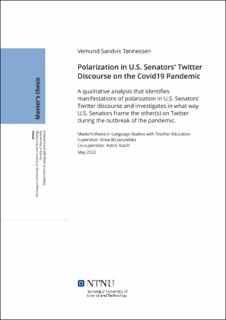| dc.contributor.advisor | Bil-Jaruzelska, Anna | |
| dc.contributor.advisor | Rasch, Astrid | |
| dc.contributor.author | Sandvik-Tønnessen, Vemund | |
| dc.date.accessioned | 2022-07-05T17:21:12Z | |
| dc.date.available | 2022-07-05T17:21:12Z | |
| dc.date.issued | 2022 | |
| dc.identifier | no.ntnu:inspera:109722273:25528219 | |
| dc.identifier.uri | https://hdl.handle.net/11250/3002869 | |
| dc.description.abstract | Politisk retorikk kan påvirke holdninger og oppførselen i befolkningen. Polarisering i politiske oppfordringer kan hindre en effektiv respons til en omfattende krise. Felles handling, presis informasjon og endring i oppførsel kan senke spredningen av koronaviruset og redde liv. Denne oppgaven finner tegn på polarisering i twittermeldinger publisert av amerikanske senatorer under utbruddet av koronavirus pandemien. Oppgaven ser også på hvordan amerikanske senatorer representerte "den andre" i sine meldinger. Jeg har designet flere kategorier som illustrerer motivene i twittermeldingene. Jeg argumenterer for at medlemer fra det demokratiske partiet presenterte president Trump og hans regjering som den primære negative aktøren. Samtidig presenterte medlemmene fra det republikanske partiet Kina og Verdens helseorganisasjon (WHO) som de negative aktørene. Denne oppgaven argumenterer for at politikerne varierer sin grad av aggressivitet ut ifra hvilken effekt de prøver å oppnå. Helt til slutt argumenterer jeg for at positiv presentasjon av seg selv eller sin gruppe også fungerer som negativ presentasjon av den andre aktøren. | |
| dc.description.abstract | Messages sent by political elites are considered to influence public attitudes and behavior. Polarization in political discourse may hamper effective responses to public health crises. National unity, accurate information, and behavioral change can slow the spread of the coronavirus and save lives. By analyzing 21 tweets on Twitter, this thesis detects manifestations of polarization in messages sent by U.S. Senators during the outbreak of the coronavirus pandemic, and it investigates in what way U.S. Senators frame a specific other. I have inductively designed several political strategies that illustrate the political motives of the tweets. I argue that Democratic Senators primarily frame President Trump and his Republican administration as the negative other. At the same time, the Republican Senators primarily frame China and the World Health Organization. This thesis suggests that the Senators vary the degree of aggressiveness in their tweets depending on what effect they intend to achieve. Finally, I argue that positive self-presentation implicitly functions as negative other presentation. | |
| dc.language | eng | |
| dc.publisher | NTNU | |
| dc.title | Polarization in U.S. Senators' Twitter Discourse on the Covid19 Pandemic | |
| dc.type | Master thesis | |
